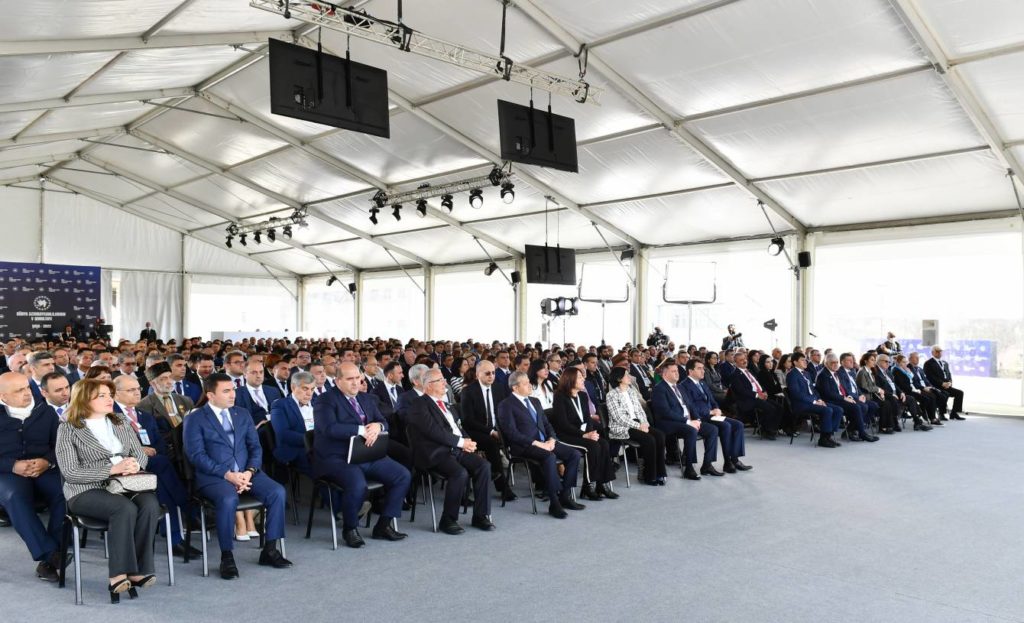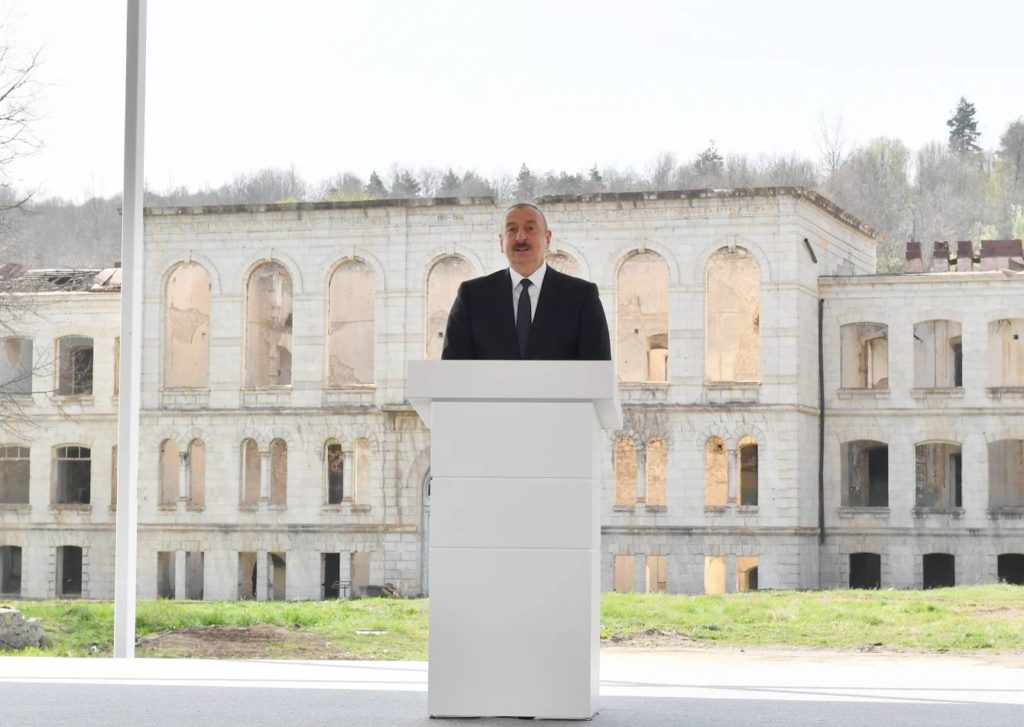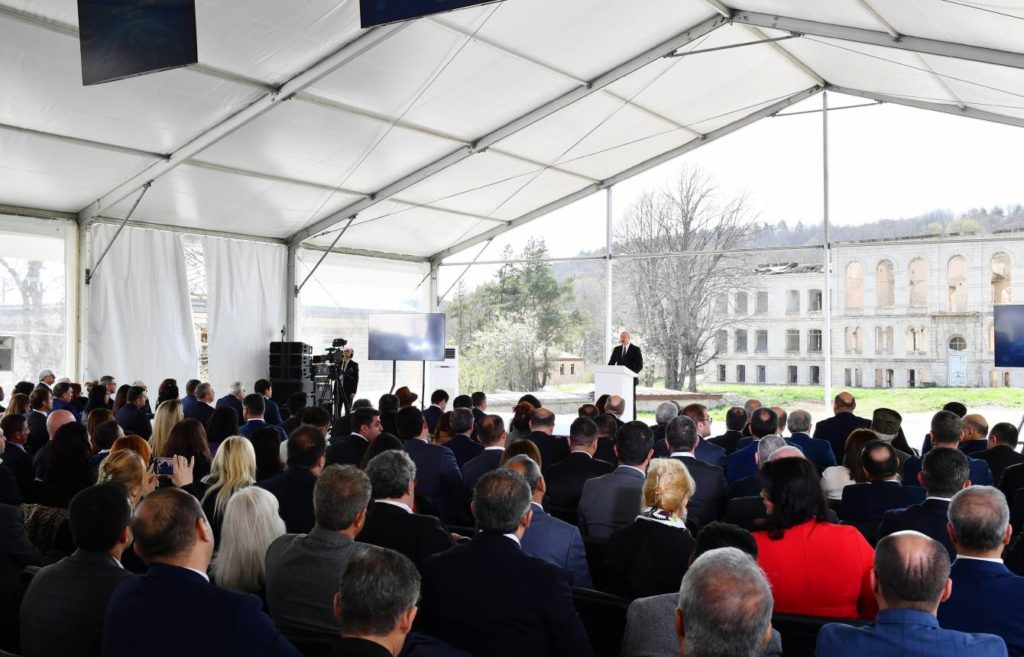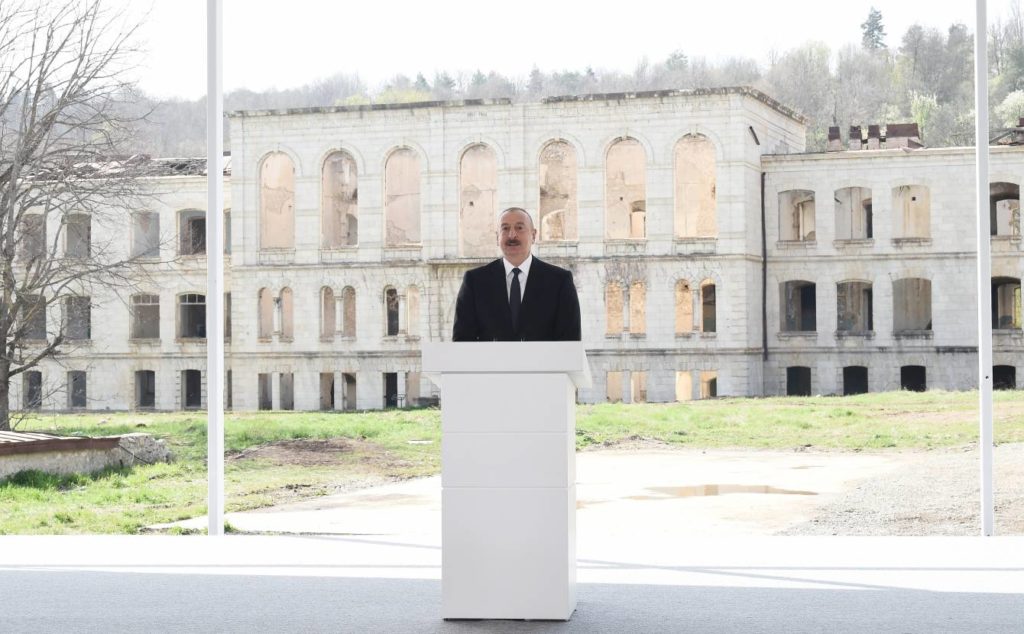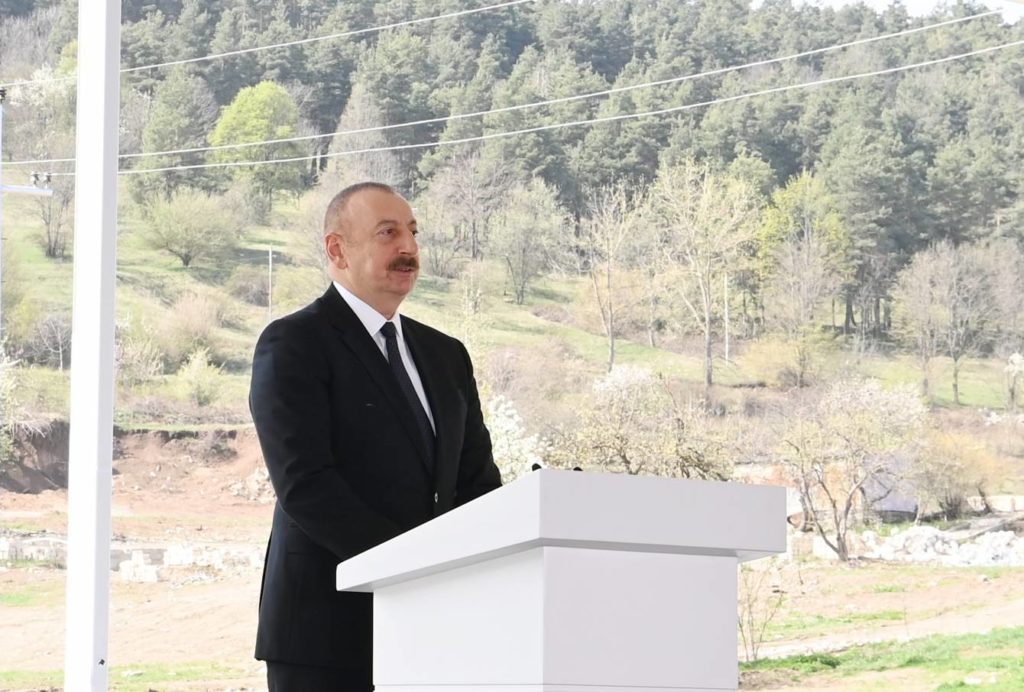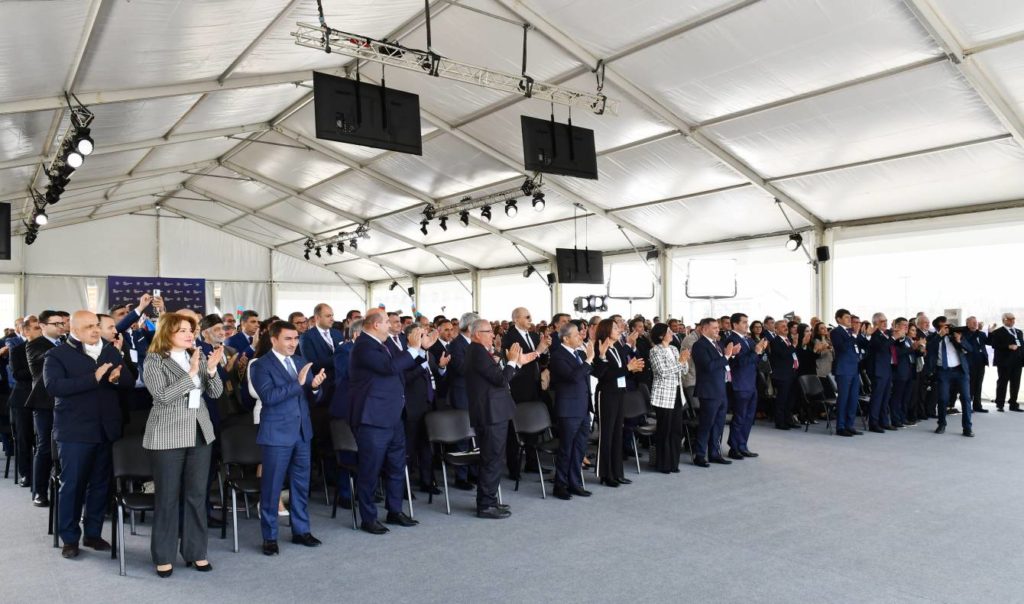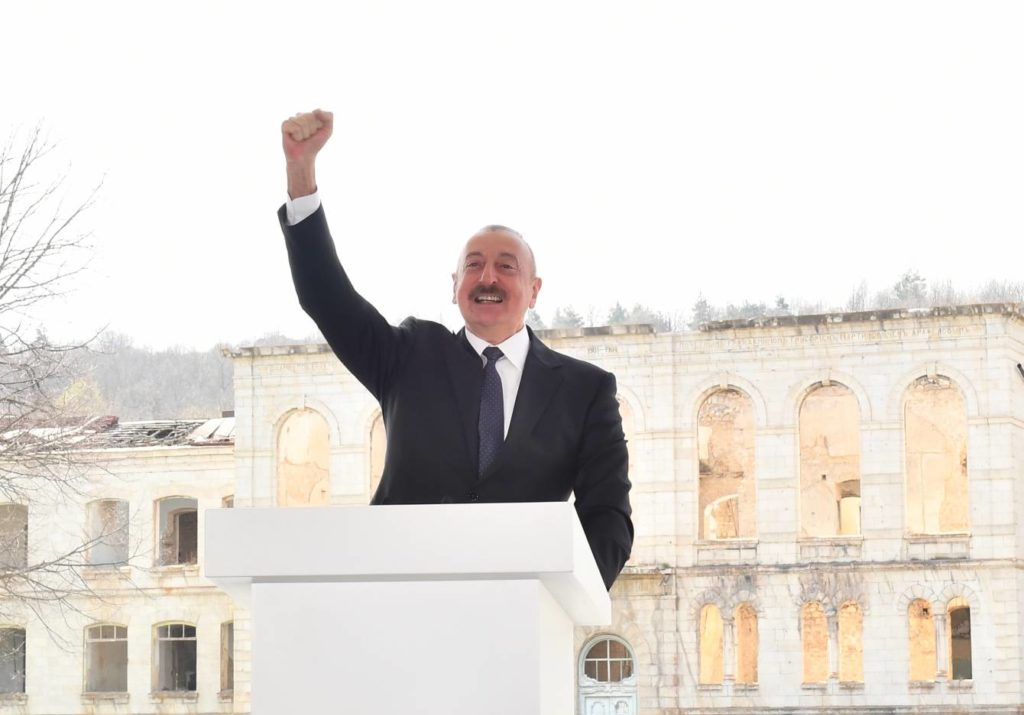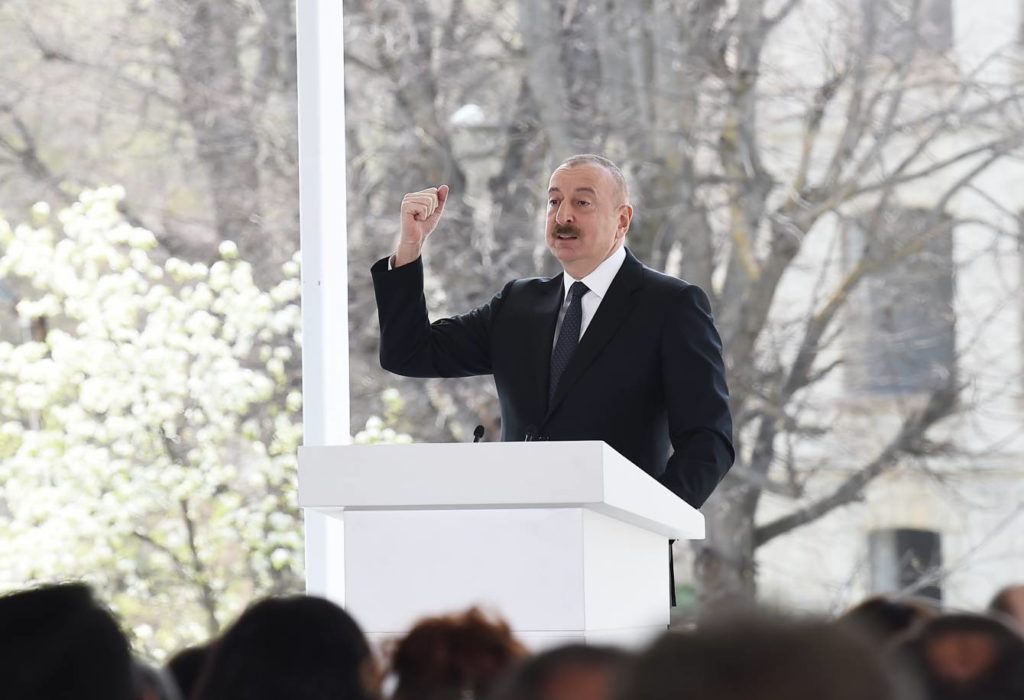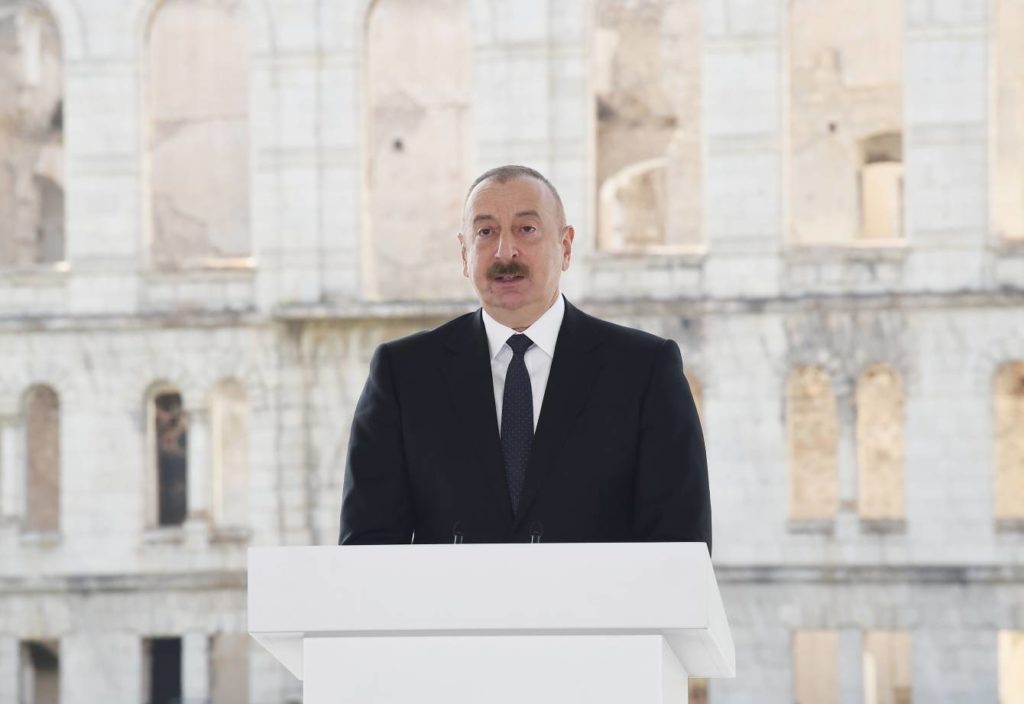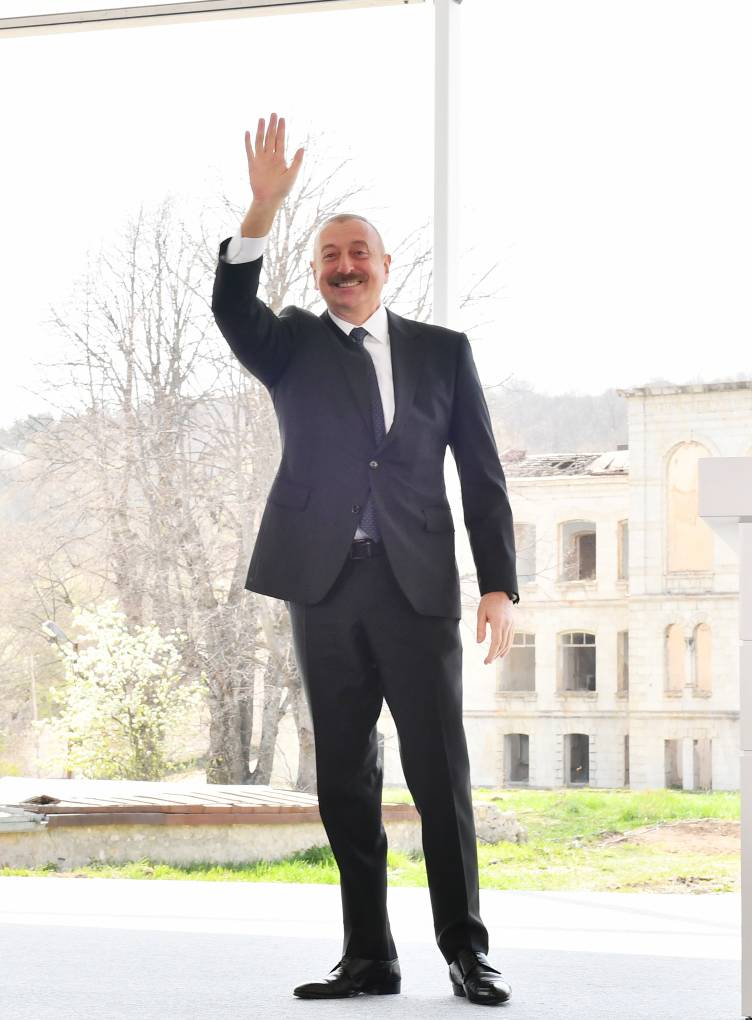President's visits to Shusha
- President’s decree on Shusha- President’s visits to Shusha- Reconstruction in Shusha
Shusha Today
Ilham Aliyev gave a speech at 5th Congress of World Azerbaijanis in Shusha

22 April 2022, 10:00
The fifth Congress of World Azerbaijanis has today kicked off in the city of Shusha.
President of the Republic of Azerbaijan Ilham Aliyev gave a speech at the Congress.
Speech of President Ilham Aliyev
– Dear participants of the congress! I sincerely welcome you! Welcome to Shusha and Karabakh!
First of all, let us commemorate our dear martyrs who died for the Motherland with a minute of silence.
May their souls rest in peace!
We avenged our martyrs on the battlefield. We took revenge on the battlefield. Their blood did not remain on the ground, which is a consolation for their relatives, for all the people of Azerbaijan.
Today we are holding a Congress of World Azerbaijanis in free Karabakh and free Shusha. The name of this congress is Victory Congress, and this is natural. Because for the first time after the historic Victory, Azerbaijanis from all over the world are gathering to hold a congress. In general, the name Victory is very appropriate for our people. You have come here through Victory Road, the name of the congress is Victory Congress. At present, Victory Museums are being built in different parts of the country, first of all, in liberated lands.
From now on, the people of Azerbaijan will forever live as victorious people, and the state of Azerbaijan will live as a triumphant. This is excellent happiness – for all of us, for those living in Azerbaijan, Azerbaijani citizens, and Azerbaijanis living abroad. Our heroic sons who carried out this historic mission have rendered unparalleled services to history, the people and the Motherland. Young people who grew up in the years of independence, young people who grew up in the spirit of patriotism, showcased this historical feat and presented historic news to the people of Azerbaijan.
On the way here, I remembered the first congress held in 2001. The first congress was held on the initiative of great leader Heydar Aliyev in 2001. In his profound speech, the Great Leader expressed his views on the Karabakh problem, of course, and said that Azerbaijan would restore its territorial integrity, the occupied territories would be liberated from occupation, and the Azerbaijani people would return to their ancestral lands. We, the followers of the Great Leader, have made these words come true. I was informed about the start of preparations for the 5th Congress, and I said that this congress must definitely be held in Shusha. I am sure that the congress participants have also welcomed this idea and have come to Shusha, ancient Shusha, the capital of our culture, with great enthusiasm. Shusha also greets its dear people with such sunny weather, which once again shows that this is our historical land. Even nature and the sun are in solidarity with us.
The solution to the Karabakh conflict was a significant task for me as President. Since day one of my presidency, the solution to this issue and the development of the post-conflict period in the interests of Azerbaijan have been my top priority. All resources have been mobilized. All of us – both Azerbaijani citizens living in Azerbaijan and Azerbaijanis living elsewhere in the world – were focused on achieving this goal. I said that every single one of us must work hard to bring this holy day closer every day. There was no more important and noble task than to work towards the liberation of our lands from occupation. This is why the army building process was carried out swiftly, this is why Azerbaijan has acquired a modern army, this is why the young generation was brought up in the spirit of patriotism, hatred of the enemy and loyalty to the Fatherland, and this is why economic reforms were carried out. At the heart of all our work, our policy, and our steps were the desire to bring this holy day closer, to see this day. We have achieved this thanks to our own strength. Instead of 30 years of meaningless negotiations, the people of Azerbaijan demonstrated their strength, restored justice, restored international law and proved to the whole world that we are a great nation and that these people, the Azerbaijani people, never intended to come to terms with the occupation.
I have repeatedly said, including at the congresses of World Azerbaijanis held after the first Congress, that we will never put up with this occupation. We will liberate our ancestral lands from occupation at any cost. But I really wanted this issue to be resolved peacefully, not through war, because I believed that this issue could be resolved peacefully. The norms and principles of international law supported the position of our country. The world’s leading international organizations adopted decisions and resolutions supporting Azerbaijan’s position based on justice. Armenia’s policy of aggression was no longer a secret to anyone in the world. At the same time, after the balance of power between Azerbaijan and Armenia had changed dramatically in our favor, I thought that the Armenian leadership would finally realize that they had no resources to compete with us – political, economic or human. I thought that Armenia would finally come to its senses and understand that in a 21st-century world, it is impossible to occupy a large part of the territory of a neighboring state. Unfortunately, the Armenian leadership, as well as the international community and international organizations, were of a different opinion, and the protracted negotiations, which lasted almost 30 years, were simply aimed at perpetuating this occupation, covering up Armenia’s policy of aggression and making us come to terms with this painful situation. Of course, we could never agree to that, and our resolve, determination and heroism on the battlefield proved this again. We didn’t wage war only with Armenia. We didn’t wage war only with the Armenians of the world, we fought against Armenia’s patrons, and we have won this war. Therefore, the historic significance of this victory is even greater. We have proved that we are ready to die. We would rather die than back down. During the years of independence, our young people who grew up in the spirit of patriotism were ready to embrace death for the sake of the Motherland.
Most of those martyred in the second Karabakh war were younger generation members. None of them had been to Karabakh, they had never seen this land, but the national spirit, justice and love of the country living in their hearts led them to death. We showed the whole world how to fight in the 21st century, how to fight with dignity, how to fight in modern ways, and in a matter of 44 days, the Armenian army was completely destroyed. The cost of Armenia’s destroyed weapons, equipment and equipment captured as booty is at least $4-5 billion. It is also another matter where such a poor country could get this money, but there is almost no Armenian army now. During the war, there were mass desertions in the Armenian army. According to their own sources, there were 10,000 deserters in the Armenian army. There were no deserters in the Azerbaijani Army. This is the greatness of our people, the confidence of our people in victory, the unity of the people and government, and the unity of Azerbaijanis worldwide. I know that you and millions of other Azerbaijanis living abroad were closely following the course of the war in your countries. At the same time, in your communications, comments on social networks and other resources, you conveyed the true voice of Azerbaijan to the public. That is still necessary today. There is still a need for that today because even though the war is over, the territorial claims against us are not over yet. I am sure that this will end. I am confident that as a result of our efforts in the post-war period and as a result of our subsequent efforts, we will get rid of the territorial claims of Armenia and Armenians of the world against Azerbaijan.
But there are still such claims today, and we must be prepared for that. During the war, we liberated more than 300 towns and villages on the battlefield in a matter of 44 days. This is why Armenia was forced to sign an act of capitulation in the early hours of 10 November. It was after we had liberated Shusha on 8 November that the Armenian leadership finally realized that continuing the war would cost them even more dearly. However, if they had listened to my words in the first days of the war and given us the schedule of their withdrawal from the occupied territories, the war could have stopped earlier. During the war, I repeatedly appealed to the people of Azerbaijan, saying that the Armenian leadership should provide us with a timetable of when it would vacate our lands. As soon as that happened, we would stop the war. And this is exactly what happened. But they were forced to do so. In 44 days, the Armenian army and the Armenian state were destroyed entirely and found themselves on the brink of a precipice. They had to sign an act of capitulation on 10 November, and we returned to Aghdam, Kalbajar and Lachin districts without a single shot being fired. Thus, we resolved the war by military and political means. Let me repeat this – we did that alone, without any mediators.
As for the mediators, unfortunately, high-ranking officials in Armenia are still talking about the Minsk Group. I think this is pointless, and it makes no sense. The Minsk Group was virtually paralyzed in 2019. The group, which was mandated to address the issue in 1992, has failed to achieve any results. Looking at the actions of this group and proposals in retrospect, we can see again that this group was not established to resolve the problem. We were just a little naive at the time. This group was established not to resolve the problem, but to perpetuate the fact of occupation. Armenian lobby groups are quite influential in the Minsk Group co-chair countries. This is why this group did not achieve any results for 28 years.
In 2019, the group almost ceased its activities. The reason for that was the bizarre behavior of the new Armenian leadership. Because when the new leadership of Armenia came to power in 2018, both the Minsk Group, I must say quite frankly, and we had certain hopes that the criminal junta regime had been overthrown. A new generation of politicians had come to power. We were hoping that they would realize that they were not in a position to fight or wage war with Azerbaijan. Active negotiations for almost a year reinforced these ideas even more. However, in 2019, the Armenian leadership began to take a completely different position. The ludicrous statements voiced by the Armenian leadership virtually put an end to the process of negotiations. By saying that “Karabakh is Armenia, full stop,” they put an end to the negotiating process, and the Minsk Group, which met with me after this statement, was in a very uncertain situation because it was impossible to hold any talks after this statement. Because the essence of the talks was to liberate the occupied territories.
As a matter of fact, the Minsk Group has not been able to take any action, at least for the sake of visibility. But the Armenian leadership went even further. After that, explicit threats were voiced against us. We were threatened with a new war for new lands. But the international community continued to stay tight-lipped over that. This is an obvious threat. It was another threat from an occupier state to the state whose lands were already occupied. In other words, we were threatened with renewed occupation. However, the UN, the OSCE, other organizations or the Minsk Group made any statements about that. Inspired by this, of course, the aggressor became even more depraved and actually started to believe in the mythology Armenia had been concocting for decades.
We have shattered this mythology and driven the enemy out of our lands in a matter of 44 days. Armenia was brought to its knees before us, bowed its head, was forced to sign an act of capitulation, asked for help, and it is still in that situation now. Even today, there is no door left they wouldn’t knock on, whining that Azerbaijan is threatening us, Azerbaijan wants to strangle us here. We have fulfilled our duty. We don’t set our sights on the lands of other states, and we never have. But we will not give our land to anyone either, and the second Karabakh war proved that again.
In other words, the Azerbaijani soldier put an end to the conflict – the heroic Azerbaijani soldier. The last events of the war unfolded here in Shusha. Climbing the steep cliffs, our heroic soldiers and officers defeated the Armenian army, which was armed with cannons, tanks and artillery, in a face-to-face fight. After the Shusha Victory, Armenia tried to put up some resistance for only one day – if that can be called resistance at all – and stated on 9 November that it was ready to sign an act of capitulation.
We fought the war with dignity, acting with dignity in the post-war period. We can already talk about the results of the post-conflict period. Because I want to say again that our victory, the victory we achieved in 44 days, was unexpected for many. Military experts, politicians and representatives of various organizations dealing with this issue have always told us that Azerbaijan could not win this war. Because throughout the 30 years, Armenia had been building fortifications and defense lines in the occupied territories. At the same time, the natural terrain of Karabakh is such that it would be difficult for us to liberate the lands, we were told. There will be many losses, but all these assumptions have been overturned as a result.
They had overlooked one issue – the determination of the Azerbaijani people, the strength of the Azerbaijani soldier and the love of the motherland. Yes, there were indeed five lines of defense in some places and six lines of defense in other places. There were fortifications, barbed wire, pieces of iron and so on. The geography of the region was very unfavorable for us. Despite all this, we fulfilled our historic mission with minimal losses, with losses two or three times less than those of the Armenian army, and ended the war here in our historic city.
Everyone coming to Shusha now. Every Azerbaijani can see that Shusha is an Azerbaijani city. If it were not the case, Shusha would not be in such a difficult state. You and other visitors have come here now, a year and a half after the war. But if you had come here immediately after the war, you would have seen the situation. It is still in a run-down state. But Shusha is being restored, Shusha is being revived, and work on the revival of Shusha is very extensive, and you will be informed about that.
If this city were Armenian, would they bring it to such a state? A total of 1,800 people lived here. In fact, 90 percent of them were servicemen and members of their families. There is not a single surviving historical building left here. Armenians also dried up 17 of the 17 water springs, desecrated our mosques, demolished them and knocked down our palaces. In other words, not a single new building was constructed here. They simply exploited our natural resources, and not only in Shusha. All other cities are in the same situation. Foreign experts and journalists have likened the completely destroyed Aghdam to Hiroshima. Yes, Hiroshima was destroyed by an atomic bomb, whereas Aghdam and other cities were destroyed due to Armenian vandalism. In the 30 years since the first Karabakh war, they dismantled all our buildings and transported and sold the stones, and international organizations have recorded this in their reports. They dug graves and extracted the golden teeth of the dead. In other words, Armenia and the Armenian people have disgraced themselves worldwide for these atrocities. Therefore, everybody, every visitor coming to the liberated lands, can and must see the Armenian savagery. They should see that we have destroyed the occupier and the fascists. All their actions between the first Karabakh war and the Second Karabakh War, in the period between the two wars, were fascist in nature. They fired ballistic missiles at our peaceful cities to kill civilians during the war. If this is not fascism, then what is? Tocka-U, SCUD and Iskander-M missiles hit Shusha. After the snow melted, the remains of the Iskander-M missile were found in Shusha, in the center of the city, and we proved again that Armenia used this deadly weapon, a banned weapon and a weapon they did not have. Those who do not believe this can come and see the remains of the Iskander-M missile in the Military Trophy Park in Baku.
We have crushed fascism. We have saved the South Caucasus from fascism. However, there are still manifestations of fascism there, as some circles in Armenia and Armenians of the world, Armenians living abroad are still trying to intimidate us. However, they should not forget the history of the second Karabakh war. We have further increased our strength. During the year and a half, a lot has been done in the field of army building. Some of this work has been disclosed to the public. Some, of course, cannot be revealed. But everyone should know that the Azerbaijani Army can perform any task today. Combat capability and national spirit, as well as morale, weapons, equipment, the creation of new combat units – we are doing all this precisely because there are still manifestations of Armenian fascism there, and we should always be prepared to crush Armenian fascism if it happens to raise its head ever again. Armenia knows and understands this perfectly well and should never forget it.
We will only go from strength to strength from now on, and the post-war period shows this again. Both the restoration of the territories and our steps at the international level have shown our strength. The post-war period is very sensitive, and a year and a half after the war, we can confidently say that we have passed this difficult test with dignity. Leading international organizations have embraced the postwar realities, including the UN, which held an international event in Shusha. The European Union is currently very active in the process of normalization of relations between Azerbaijan and Armenia. The OSCE understands perfectly well that the Minsk Group no longer exists. I was indeed asked a few months ago, before the Russia-Ukraine war, what the Minsk Group should be doing now. I said that 2022 would see the 30th anniversary of their establishment. They will celebrate the anniversary and then retire. But since the start of the Russia-Ukraine war, they haven’t had the opportunity to celebrate the anniversary.
Other international organizations, for example, the Non-Aligned Movement we are chairing, the Organization of Islamic Cooperation and all other leading international organizations, have supported our position and accepted the post-conflict realities. Five neighboring countries have now established a 3+3 format of cooperation. All neighboring countries have accepted the post-conflict realities. This is clearly stated in the letters I have received from leaders of the world’s superpowers – the United States, Great Britain, the President of the United States, and the Prime Minister of the United Kingdom. So we have already passed this stage, and the issue of normalization of Azerbaijani-Armenian relations is on the agenda now. Again, it is us who set out this agenda. Despite all the painful moments, despite the occupation and despite all the atrocities committed, we believe that this is necessary for the future of the region. So we came up with a peace agenda, but there was no response from Armenia. International organizations also showed little interest in that. So we put forward a proposal consisting of five specific principles, and Armenia has accepted these five principles. Thus, the Armenian leadership has officially stated that it recognizes the territorial integrity of Azerbaijan and has no territorial claims to Azerbaijan and will not do so in the future. This is an essential moment for the post-conflict period, and we intend to conduct further negotiations based on these five principles.
At present, the foreign ministers and ministries of the two countries are setting up working groups, and I think concrete talks should be initiated soon. The talks should not be delayed because a peace agreement will be signed based on five principles. Therefore, the text of the agreement can be prepared and signed soon. Thus, the relations between Armenia and Azerbaijan can be established, including diplomatic. By making this proposal, we once again show our good intentions and, I repeat, show foresight. The revengeful forces occasionally raising their voices in Armenia should remember that this is the only way out for Armenia, their last chance perhaps. If they refuse, we will not recognize the territorial integrity of Armenia either and will officially declare that. Given the consequences of the second Karabakh war, the Armenian side should understand what this might lead to.
Again, despite all these positive trends, every single one of us – the Azerbaijani government, embassies, diaspora organizations and all activists – should convey the new realities to the world community. You, the Azerbaijanis living abroad, have more significant opportunities in this area. In recent years, our diaspora organizations have become very active, both during the second Karabakh war and before. Despite the physical attacks of Armenian radical forces – they took advantage of their numerical superiority to commit crimes against our activists – the Azerbaijanis had their say, and this must continue to be the case.
In other words, the public of the countries where you live should be made aware, so to speak, of the realities of Azerbaijan, the post-conflict period and the history of our country. I think this is very important because historical factors are always crucial for the settlement of any conflict through political and other means. And history is evident. There is no need to go too far. It is enough to inform the international community about the agreements signed in the 19th century – the Kurakchay, Gulustan and Turkmenchay peace treaties. There is no mention of an Armenian population in them. Ibrahimkhalil khan of Shusha and Karabakh signed the Kurakchay agreement – this was his official title. After the historical events of the 19th century, a process of resettlement of Armenians to Karabakh began en masse. This is no secret.
The world community and experts are already aware of this, and it would be good if the general public also knew this. We must inform the international community about the injustices committed against the Azerbaijani people and the resettlement of Armenians to Azerbaijani lands in the 19th and early 20th centuries. It is a historical fact that Zangazur was severed from the rest of Azerbaijan and handed over to Armenia by the Soviet government in 1920. The fact that the Azerbaijan Democratic Republic ceded Iravan to Armenia two years prior to that is also a well-documented fact. In 1921, the Soviet government was preparing to perpetrate another provocation against us. Zangazur was taken away from us in November 1920, and a year later, the Caucasus Bureau wanted to take Karabakh away from us as well. However, it didn’t work, and the decision was made to keep Nagorno-Karabakh within Azerbaijan.
Nevertheless, a year and a half later, on 7 July 1923, a completely unfounded and artificial entity was established in the territory of Azerbaijan – the Nagorno-Karabakh Autonomous Region. There was no basis for that. At that time, the number of Azerbaijanis living in present-day Armenia was probably twice as high as that of Armenians living in Karabakh. Still, for some reason, this autonomous region was established here, not there. They created it and, at the same time, included the ancient Azerbaijani city Shusha in it to make Shusha Armenian. Because Shusha was the only great fortress, and as you probably know very well, all the roads to Shusha passed through places inhabited by Armenians. In other words, to come to Shusha, it was necessary to pass through the villages inhabited by Armenians. We have now built Victory Road. Our soldiers and officers paved Victory Road with their feet – through those mountains, valleys and forests. So it was another provocation. In other words, to take Shusha away from us and make it Armenian, they included Shusha in this artificial entity. But it didn’t work, no matter how hard they tried. Shusha has always preserved its national spirit, and the Armenians could not make Shusha Armenian during the occupation.
Then the mass deportation of Azerbaijanis from Armenia in the 1940s and 50s was a great tragedy and yet another injustice against our people. Azerbaijanis were forcibly relocated from their historical lands to the Mil-Mughan zone of Azerbaijan. This was done against Azerbaijan even though 300,000 Azerbaijanis went to war in World War II and never returned home. It was Azerbaijan that supplied 90 percent of the Soviet Army’s fuel during World War II. If it hadn’t been for Azerbaijan, if it hadn’t been for Azerbaijani oil, the Soviet Union wouldn’t have won the war. So what kind of morality does this injustice against our people fit into just three to four years after the war?
This is history. We need to know this history. Without knowing this history, the history of the 1980-90s will be incomplete. The separatist tendencies that began in the late 1980s virtually tore most Karabakh from Azerbaijan. They started this back during the Soviet era. A special steering committee was set up, and a pro-Armenian man from Moscow was appointed to head it. The subsequent events are also well-known. For two centuries, our people have gone through all this suffering and finally had their say. Finally, we have crushed the head of the enemy with an “iron fist” and restored historical justice and national dignity. Therefore, these historical moments must always be on the agenda of diaspora organizations.
Of course, I am delighted that our diaspora organizations operating abroad are in constant contact with Azerbaijan, in contact with the State Committee, and coordination between diaspora organizations operating in different countries is improving. This is also very important. Of course, all of us – Azerbaijanis living in Azerbaijan – want Azerbaijanis living abroad to be in close contact with their historical homeland. It would be great if the Azerbaijanis could come to Azerbaijan with their family at least once a year – especially to the liberated lands. Today we are holding this congress in Shusha. However, the liberated territories cover more than 10,000 square kilometers, routes are being opened, and airports are being built now. Therefore, the arrival and departure will be very comfortable.
Of course, we want the second and third generations of Azerbaijanis to be attached to their culture. Of course, this is not an easy task. First of all, they must speak the Azerbaijani language. Of course, it is possible to keep the Azerbaijani language alive only in families, but it is not enough. Therefore, we are always ready to help open Azerbaijani schools and Sunday schools. In fact, we are already doing that. Perhaps we need to do it more organized manner because the mother tongue is a crucial factor. The native language brings all Azerbaijani citizens closer together.
Our young Azerbaijanis living abroad must know the history of the second Karabakh war and convey these truths to their friends. In other words, Azerbaijanis living abroad are a great force. Their activity is significant for our country. Their activity and communication of Azerbaijani realities and protecting Azerbaijan’s interests strengthen our state, of course. As the state of Azerbaijan, we are always interested in the lives of Azerbaijanis living abroad. We establish contact with them. This is an important factor in interstate relations. In contact with my colleagues and leaders of countries where Azerbaijanis live, I always pay attention to this issue.
The congress held in Shusha has a tremendous historic significance. Azerbaijan has entered a new era. We have lived as a country whose territory has been occupied for 30 years. It was challenging for us – for me as President, for every citizen, and for you, the Azerbaijanis living abroad. We knew that there was no factual basis for that defeat. It is only the events that took place in Azerbaijan in the early 1990s – the war for power, national treason, betrayal and other evil deeds – that brought about that situation. We knew that we deserved this Victory. I want to say again, as I did at the beginning of my speech, that my main priority as President was to strengthen our country and restore our territorial integrity. It wasn’t very easy for you, too, because there are Armenian diaspora organizations in the countries where you live. You involuntarily communicate with Armenians, meet with them or attend different events together. I understand that this was a tough period for you.
But the situation is entirely different now. We are holding our heads high now, with a smile on our faces, which will always be the case. I am fully convinced that from now on, the Azerbaijani people will forever live as victorious people, and the Azerbaijani state will forever live as a victorious state. We are on our land, we stand firm on this land, and no one will ever be able to force us off these lands.
Long live Shusha! Long live Karabakh! All together: Karabakh is Azerbaijan! Thank you.
X X X
The Congress continued with panel sessions on the topics “Tasks facing the Azerbaijani Diaspora in the post-war period; action plan/road map,” “Contributions of the Azerbaijani Diaspora to the restoration and reconstruction of Karabakh.”
The two-day Congress brought together over 400 diaspora representatives and guests from 65 countries.
The first Congress of World Azerbaijanis was held on the initiative of national leader Heydar Aliyev in 2001. The second, third and fourth congresses took place under the orders of President Ilham Aliyev in 2006, 2011 and 2016, respectively.
https://president.az/en/articles/view/55859
